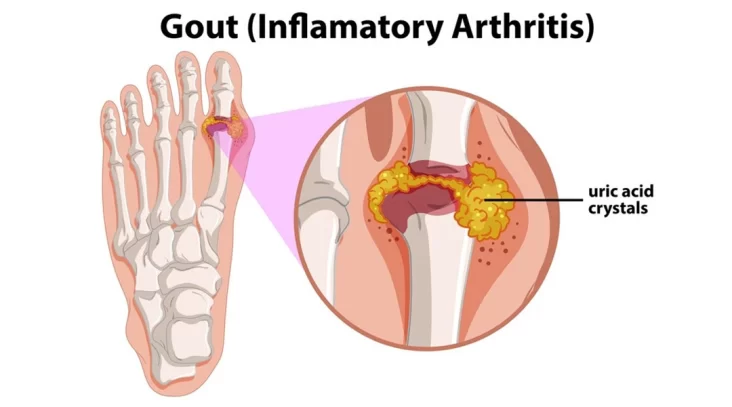Gout is a type of arthritis characterized by sudden and severe attacks of pain, redness, swelling, and tenderness in the joints, most commonly affecting the big toe. It occurs due to the accumulation of uric acid crystals in the joints, leading to inflammation and pain. Treatments for gout aim to relieve symptoms, prevent future attacks, and reduce the risk of complications such as joint damage and kidney stones. Here’s a comprehensive overview of treatments for gout:
Lifestyle Modifications
Dietary Changes: Limiting purine-rich foods such as red meat, organ meats, seafood, and alcohol can help reduce uric acid levels. Increasing consumption of low-fat dairy products, fruits, vegetables, and whole grains may be beneficial.
Hydration: Drinking plenty of fluids, particularly water, helps flush out uric acid from the body and reduces the risk of crystal formation.
Weight Management: Maintaining a healthy weight through diet and exercise can lower uric acid levels and decrease the frequency of gout attacks.
Medications:
Nonsteroidal Anti-Inflammatory Drugs (NSAIDs): Drugs like ibuprofen, naproxen, or indomethacin help reduce pain and inflammation during acute gout attacks. They are most effective when taken at the earliest signs of symptoms.
Colchicine: This medication can relieve gout pain and inflammation, especially when NSAIDs are not tolerated or contraindicated. It’s most effective when taken within the first 12 hours of an attack.
Corticosteroids: Oral or injectable corticosteroids like prednisone may be prescribed for acute gout attacks if NSAIDs and colchicine are ineffective or not tolerated.
Xanthine Oxidase Inhibitors: Medications like allopurinol and febuxostat lower uric acid levels by inhibiting the enzyme responsible for its production. These drugs are taken daily to prevent gout attacks and reduce the risk of complications.
Uricosuric Agents: Drugs like probenecid increase uric acid excretion through the kidneys, thereby reducing serum uric acid levels. They are usually prescribed for patients who under-excrete uric acid and cannot tolerate xanthine oxidase inhibitors.
Acute Attack Management:
Rest and Elevation: Resting the affected joint and elevating it can help alleviate pain and reduce swelling during acute gout attacks.
Ice Packs: Applying ice packs to the affected joint for 15-20 minutes several times a day can help relieve pain and inflammation.
Joint Aspiration (Arthrocentesis): If the pain is severe or the diagnosis is uncertain, a doctor may aspirate fluid from the affected joint to confirm the presence of uric acid crystals and relieve pain.
Analgesics: Over-the-counter pain relievers like acetaminophen (paracetamol) may provide some relief from mild gout pain, although they do not address the underlying cause.
Preventive Measures:
Long-Term Medication: For individuals with recurrent gout attacks or complications, long-term medication to lower uric acid levels may be necessary. Compliance with medication is essential to prevent future attacks and complications.
Regular Monitoring: Monitoring serum uric acid levels through blood tests can help ensure that medications are effective in reducing uric acid levels to target levels (<6 mg/dL) and prevent future attacks.
Education: Patients should be educated about the importance of lifestyle modifications, medication adherence, and early recognition of gout symptoms to effectively manage the condition and prevent complications.
Alternative Therapies:
Dietary Supplements: Some people find relief from gout symptoms with supplements like cherry extract, fish oil, and vitamin C, although evidence supporting their effectiveness is limited.
Herbal Remedies: Herbs such as devil’s claw, turmeric, and ginger are purported to have anti-inflammatory properties and may help alleviate gout symptoms, but more research is needed to confirm their efficacy and safety.
In conclusion, the treatment of gout involves a combination of lifestyle modifications, medications, acute attack management, preventive measures, and possibly alternative therapies. Early diagnosis and appropriate management can help control symptoms, reduce the frequency of attacks, and prevent long-term complications associated with gout. Individuals with gout should work closely with their healthcare providers to develop a comprehensive treatment plan tailored to their specific needs and circumstances.

